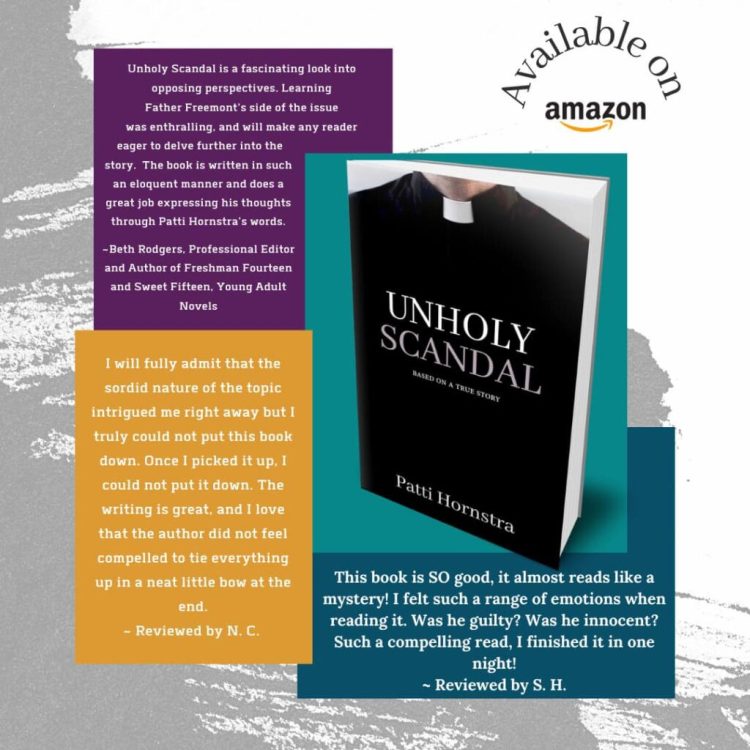
What is the date you began writing this piece of fiction and the date when you completely finished the piece of fiction? I started working on Unholy Scandal in 2006 and completed it in late 2021, so it took 15 years start to finish. It was published in March 2022.

Where did you do most of your writing for this fiction work? And please describe in detail. And can you please include a photo? I’m fortunate to have a beautiful view of the Piankatank River (a tributary of the Chesapeake Bay in Virginia) from my office window. I did most of my writing there. When the pandemic hit in 2020, I moved my desk in front of the window. I was spending so much time at the computer, and I wanted to take advantage of the view. It’s awesome to look up and see boats passing by as you write.

What were your writing habits while writing this work- did you drink something as you wrote, listen to music, write in pen and paper, directly on laptop; specific time of day? I write directly on the laptop, but I did have a ton of notes on a legal pad and lots of printouts from research before I got started.
For this book, my second one, I used a writing program called Scrivener, which was a great way to organize my work. It did have a learning curve, but I’ve found it to be very helpful in keeping my work organized.
I write when the mood hits me. It could be day or night. I do prefer quiet when I write, I find music and the television to be distracting when I’m writing.
Once I sit down at the computer to write, I’ve basically written the passage in my head already. That’s been my habit since college. I’d write an entire research paper in my head before it even went on paper. I’m more of an inspirational writer.

Please include just one excerpt and include page numbers as reference. This one excerpt can be as short or as long as you prefer.
This is part of the introduction, page 7:
Nolo Contendere
In 1963, Henry Alford was indicted by the state of North Carolina on charges of first-degree murder, which could have resulted in the death penalty had he been convicted. He decided to plead guilty to a lesser charge of second-degree murder in order to avoid the death penalty. He appealed his conviction under the grounds that he was forced to plead guilty to the lesser charge to avoid being put to death. Thus, the Alford Plea: the defendant maintains innocence while admitting that there is sufficient evidence that a prosecutor could use to convince a judge and/or jury of guilt beyond a reasonable doubt. It is sometimes called a plea of no contest or nolo contendere.
The size of the crowd was daunting, filling the red brick steps of the Rutherford County courthouse and overflowing onto the sidewalk, the grass, the parking lot.
Even through the Xanax fog that clouded my thoughts and almost numbed the pain, I recognized the familiar chants.
“Our Father Who Art in Heaven . . .”
“Hail Mary, Full of Grace . . .”
“Glory Be to the Father. . .”
Hundreds of my most faithful followers, their faces a blur to me, were gathered there in the December chill, praying the Rosary, the quintessential Catholic prayer.
My attorney, Bob James, and I had planned carefully for that day.
“Don’t wear the collar,” Bob warned. He wanted to be certain that the small-town judge saw me as a normal guy rather than as the arrogant, above-the-law cleric presented by the media over the past few months. As if that were even possible: for me to be seen as normal. The media had portrayed me as a sexual predator, a monster, and there was nothing I could do to change that. If the judge had read any of the newspaper articles about me, and I was sure he had, then there was no way that he would see me as a normal guy.
I passed through the crowd feeling almost anonymous in my street clothes, missing the comfort of the black shirt and white collar that I had worn as a priest for almost forty years. The black-and-white clerical garb had once commanded respect. Lately, it had become a symbol of suspicion, and I wondered what people thought of me when I wore it outside of the parish walls. It occurred to me then that it no longer mattered what I wore, or what the judge thought of me.
Click to order UNHOLY SCANDAL from Amazon
Why is this excerpt so emotional for you as a writer to write? And can you describe your own emotional experience of writing this specific excerpt? Unholy Scandal is based on a true story, so it’s all very emotional for me. This excerpt truly captures the emotion of the main character, Father Paul Freemont. Father Paul thinks that this is the end to the trauma that he’s been living, but it’s really the beginning of a long journey. He has no idea what lies ahead.
Were there any deletions from this excerpt that you can share with us? And can you please include a photo of your marked up rough drafts of this excerpt. There weren’t really any deletions. I tend to ‘self-edit’ as I go along. Here’s a photo of my notes and research.


Click below link to watch a video of Patti Hornstra presenting UNHOLY SCANDAL.
https://www.facebook.com/authorpattihornstra/videos/282691027336432
Most of the INSIDE THE EMOTION OF FICTION links can be found at the very end of the below feature:
http://chrisricecooper.blogspot.com/2021/03/stephenson-holts-arranged-marriage-is.html
